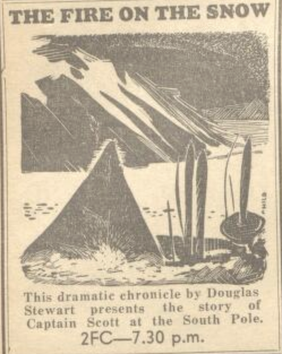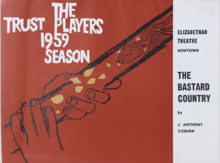
Ronald Grant Taylor was an English-Australian actor best known as the abrasive General Henderson in the Gerry Anderson science fiction series UFO and for his lead role in Forty Thousand Horsemen (1940).
The Australian Elizabethan Theatre Trust (AETT) is an Australian theatre and performing arts company based in Sydney established in 1954. It is today especially known for its music scholarship program.
The Shifting Heart is a play written in 1957 in Australia by Richard Beynon, it is an insight to the psychology of racism and its victims. In the background of 1950s Collingwood, Melbourne.

Frederick Graham Pratten was an Australian politician. He was a Nationalist Party member of the Australian House of Representatives for Martin from 1928 to 1929 and a member of the New South Wales Legislative Council from 1937 to 1976, successively representing the United Australia Party (1937-1945), Liberal Party (1945-1960) and Country Party (1959-1972).

Neva Carr Glyn or Neva Carr Glynn was an Australian stage, film and radio actress born in Melbourne to Arthur Benjamin Carr Glyn, a humorous baritone and stage manager born in Ireland, and Marie Carr Glyn, née Marie Dunoon Senior, an actress with the stage name "Marie Avis". She had one half-sister Gwendoline Arnold O'Neill and two half-brothers Sacheverill Arnold Mola and Rupert Arnold Mola. She was named "Neva" after a great-aunt, who was a contralto of some quality. Both spellings of her surname appear in print roughly equally and apparently arbitrarily.
Rape of the Belt is a 1964 Australian television film based on the play by Benn Levy.
Lloyd Berrell was a New Zealand actor who played Reuben "Roo" Webber in the original Sydney production of Summer of the Seventeenth Doll. He worked extensively in Australian radio and theatre, appearing in a large portion of the films being shot locally at that time. He also starred in the original stage production of Sumner Locke Elliott's Rusty Bugles as well as numerous productions for the Mercury Theatre.

The Fire on the Snow is a 1941 Australian verse play by Douglas Stewart about the Terra Nova Expedition to Antarctica by Robert Falcon Scott. It premiered on ABC radio on 6 June 1941 to great acclaim and inspired a series of Australian verse dramas on ABC radio.

The Slaughter of St. Teresa's Day is a play by Australian author Peter Kenna.
Swamp Creatures is a 1957 stage play by the Australian author Alan Seymour. He later adapted it for radio and TV. It was Seymour's first produced play.

"The Recruiting Officer" is a 1965 Australian television production based on the famous play The Recruiting Officer, which was the first play ever performed in Australia. "The Recruiting Officer" aired on 6 January 1965 in Sydney, 13 January 1965 in Brisbane, and on 20 January 1965 in Melbourne.

Curly on the Rack is a 1958 Australian play by Ru Pullan set in Rabaul after World War II.
"Johnny Belinda" was a 1959 Australian TV adaptation of the 1940 play by Elmer Harris which had been filmed in 1948. It was the first "live" one hour drama on commercial television in Australia.
Ned Kelly is a 1942 radio play by Douglas Stewart about the outlaw Ned Kelly.
Ben Gabriel was an English Australian character actor, director, voice artist and theatre founder. Gabriel had numerous appearances in stage and radio roles and in film and television.
The Slaughter of St. Teresa's Day was a 1960 Australian TV play based on the 1959 stage play of the same name by Peter Kenna.
The Break is a 1962 Australian play by Philip Albright. Albright was an American writer and actor who had moved to Australia. He died in 1959 and the play debuted after his death. It was an early Australian play to depict homosexuality.
We Find the Bunyip is a 1955 Australian play by Ray Mathew. It is a comedy set in an Australian country pub.
Barbara is a 1966 Australian stage play by Mona Brand. The original production was sponsored by the Elizabethan Theatre Trust. The Sydney Morning Herald called it "divertingly unpredictable."
The Observer Plays is a 1958 collection of seven plays edited by Kenneth Tynan. The plays were commended in the famous 1957 playwriting competition organised by Tynan when at the Observer newspaper.







